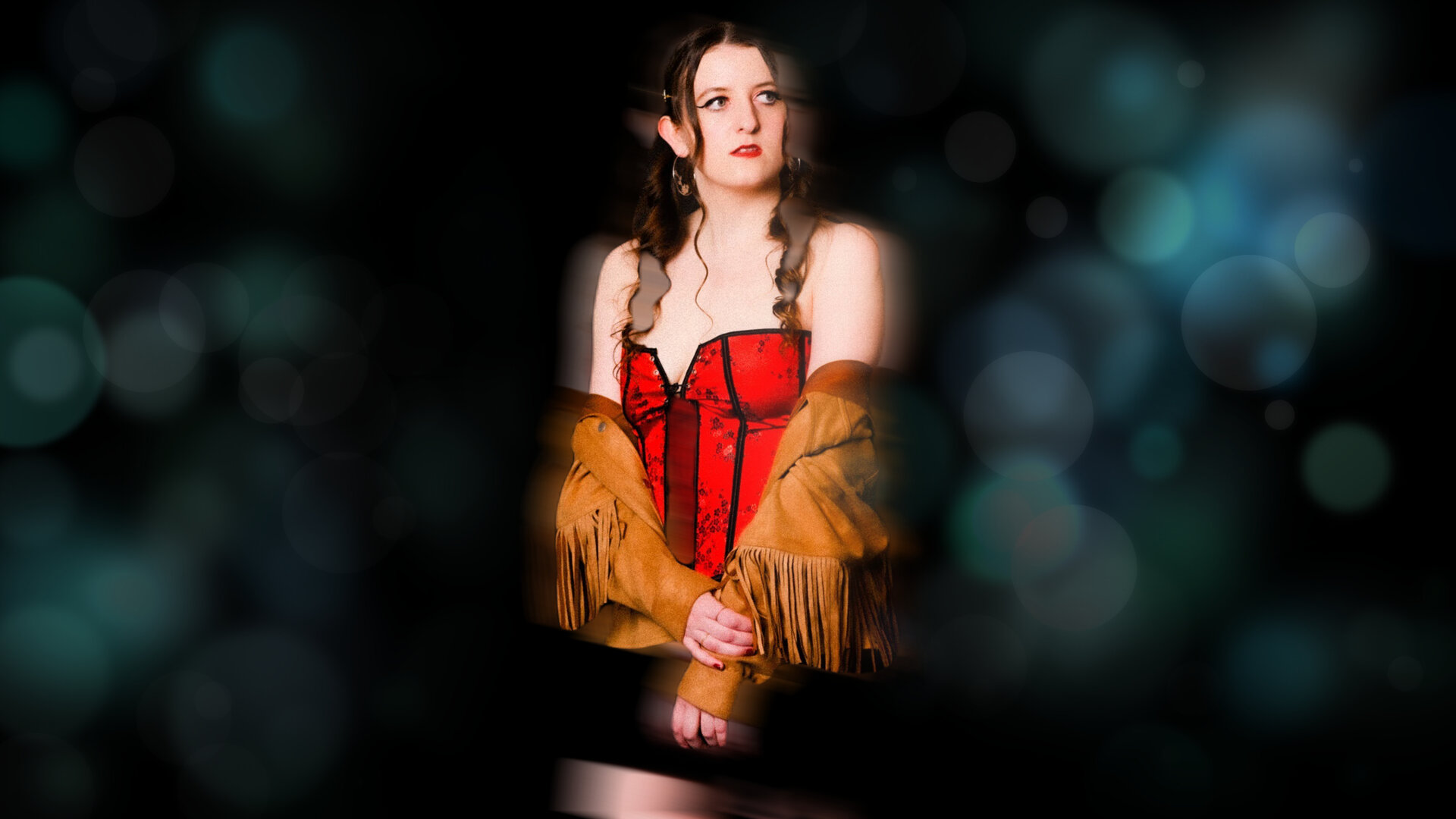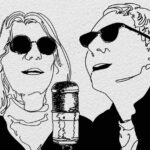
We uncover the world of singer-songwriter Flora Algera, with her formative years setting the stage for music marked by innovation and introspection. Speaking to Jason Barnard she openly discusses her intimate connection to her craft, grappling with themes of mental health, and her boundary-pushing approach to songwriting. With a debut album ‘Once Upon a Time in the West’ that seamlessly blends raw emotion with cinematic finesse, she emerges as a compelling voice.
Can you tell me about your background and what led you into music?
My dad loved music – he actually wanted to be a musician before he decided to go into business, but he still surrounded my sister and I with it. In our home growing up he’d play the score for The Phantom Of The Opera and when he’d take us on drives he’d play The Beach Boys, so I was always surrounded by a variety of different genres. I remember him playing some guitar for us and singing at night, too. I had a lot of excellent music teachers early on in school, as well, who introduced me to great music. I remember my first ever music teacher taught us about The Beatles and my dad took me to get my first CD, a copy of Rubber Soul. From there I joined every choir, musical theater production, and ensemble I could manage (even creating two of my own with a friend in middle school) until I found opera.
Could you share some insights into your time as a competitive opera singer, I understand you’ve worked with composer John Williams?
I trained privately in classical voice beginning at age 14, and I was selected to be part of the Boston University Tanglewood Institute’s Young Artist Vocal Program in 2017 and 2018. In 2018, John Williams had our choir sing under his conduction for his film night in Tanglewood with the Boston Pops – it was an incredible experience and an absolute honor. I typically avoided competitions, as they triggered anxiety for me when I did partake in them, though the general environment in classical music at that caliber felt intense, especially being so young. Ultimately I’m really grateful for that period of my life and how reclaimitive it is for me to get creative with opera now as a songwriter; a huge highlight for me (besides John Williams, of course) was performing in an all-female production of Puccini’s La boheme, my favorite opera.
Your musical influences range from Lana Del Rey to Maria Callas. How do you incorporate such diverse inspirations into your own music?
I like to think that all the songs on my album sound slightly different, which was very intentional as I drew from different inspirations for each track. However I think it’s most noticeable in my song “Ben”, where I sing a sample of Gluck’s “O Del Mio Dolce Ardor” over rock instrumentals. “Ben” in general was made by first mapping out sections of the song with my producer William. I made a Google document that had the sections separated with a list of sonic references for each bit. Typically, we look at references for a whole vibe of a track, but that song in particular had so many different influences that it felt like a little collection of songs as opposed to one single track. I wanted it to feel like a western psych-rock opera, and I think we accomplished that by making the refrain we continuously return to very Morricone-influenced and steady even with so many defined sections. And William’s arrangement of the transitions came out better than I’d imagined. As for my stuff in general, I’d say many of my vocal melodies are influenced by my history in classical music. Unlike with “Ben”, it’s usually unintentional: I’ll listen back to something I wrote and realize it sounds similar to a scale exercise I used to do every day, for example.
What motivated you to start writing poetry during your travels, and how did that evolve into songwriting?
Like how I’ve been a singer as long as I can remember, I’ve also always been a writer. My grandfather, John McCarthy was a poet (I reference him in my song Civil Unrest), so I think like how I picked up music from my dad, I picked up poetry from him. I did most of my cross-country traveling at age 19 during a gap semester I took from school with a guy I was seeing, and the first time one of my poems became a song it was a total coincidence. We were staying in an AirBnB and the host just happened to have a guitar, so I used the four chords my dad taught me and I surprised my then-boyfriend with a love song. I didn’t write songs regularly until I found myself in a treatment center in Illinois a year later for mental health and I began to use songwriting as a way to open up a dialogue between myself and my therapist. Then, the music started to just pour out naturally.
Could you discuss the significance of the short story ‘Flowers for Algernon’ in your artistic identity and the choice of your artist name?
I loved the shortened version when I read it in high school, and it always deeply resonated with me. When I read the full-length novel as an adult, it hit me even harder. Growing up being institutionalized and made to feel like an outsider (when kids already feel that way as it is), I felt like I could relate a lot to Charlie. I don’t want to say too much about it because I’d like to leave it up to interpretation, but for me personally, I had some traumatizing experiences in the system and I found so much comfort in the community I met along the way who saw my humanity beyond any diagnoses or stigma, just as Charlie found comfort in Algernon. It showed him no matter how challenging things were, he was not alone, and even during his darkest hour his wish was that someone leave flowers on Algernon’s grave. I find that beautiful and hard-hitting when I think of all whom I’ve loved and lost growing up in the system. They wanted that for me, and I, them.
Your debut single, ‘Anthem for the Psych Ward Kids’, addresses mental health issues. What inspired you to tackle this subject, and what message do you hope to convey?
I knew when I started making art that my job was to create whatever I felt was missing. It was not an easy song for me to release and I still sometimes feel uncomfortable when I’m about to perform it, because the stigma still is so alive and I have seen it and experienced it. Though, I am grateful I made the song and return to it because I know in my heart that I could have used it when I felt so isolated in my experiences, especially in my teens. A band that got me through so much was Twenty One Pilots, and Tyler Joseph did not shy away in his lyricism from those topics – that was what helped me. So, I decided to do the same and I’m ultimately glad I did. I’ve been able to play the song at a treatment center which was a very empowering experience, and I’ve also had social media messages and people at bars approach me and vulnerably share their story with me upon hearing it. What I hope it conveys is that anyone who has had a similar experience does not need to be ashamed of their past or allow it to define them. What matters is what you make of it and how you prevail.
What was the experience like working with producer William D Lucey on your singles? How did his input shape your music?
William is such an incredible producer and musician. We have since met and worked together in-person, but the entire debut album was actually created remotely and internationally over the course of about three years. We would send long messages to each other discussing the music and then hop on a Zoom call every now and then, but the workflow still felt very natural and in-sync. I genuinely feel like when I send him something I write, he just knows exactly how I hear it in my head and can translate it to the recording. Working with him in person has been even better, though, as we can try out more ideas in the moment. I can’t wait to share the latest music.
What inspired the song’s lyrics and its unique structure of ‘Idols’?
Lana Del Rey, who I reference in the song and is one of my biggest influences, has a popular interview where she advises her audience to choose their role models wisely. I was in an emotionally turbulent time in my life where I had moved out to California during the pandemic and felt incredibly isolated, wanted to start chasing my dreams as a musician but had no clue where to start, and was struggling with substance issues. I was attending a Christian college and felt like I wasn’t “good” or “pure” enough to fit in, but I longed for the kind of spirituality that my peers claimed to feel.
When I reflected on who my role models were (Lana and Kurt Cobain being two of them), I started to ask myself, “What if I’d read the Bible?”, like these peers of mine, who warned so intensely against idolatry and at the time seemed to me to have the secrets of the universe figured out. That’s when the song came out. Its unique structure was pretty natural, where I end on that refrain of “wish I had different idols, wish I had read the Bible”. I wrote that line and felt I had said what I needed to.
How do you approach your songwriting process, particularly in translating emotions into music and lyrics?
Sometimes I begin to hear a song in my head, and I have a very intense desire to write, or I feel like inspiration will pass me by. Similarly, I may have lyric ideas and need to set them to music. Typically this is when a song comes out of me very quickly. Other times, I sit down with my guitar or at the piano and I play a bit and try to see how the music makes me feel. This type of writing session is usually more meditative and gradual, though I’ve made some songs I’m very proud of (like “Ben”) this way.
Could you elaborate on the themes behind your album ‘Once Upon a Time in the West’?
About a month after I released “Anthem For The Psych Ward Kids’ ‘, I traveled to North Carolina to act in an LGBTQ+ indie short film with a director who I’d also composed “May’s Lullaby’ ‘ for originally. She had been very influenced by the Western film genre and recommended I watch some of her favorites. When I watched Sergio Leone’s “Once Upon A Time In The West”, I fell in love and began to take inspiration for “Ben” from the character of Frank in the film. At this time I also began to talk to William about using Ennio Morricone as a reference for some of his production, and it turned out he already loved his work. When I returned home from the set after we wrapped I wrote the first verse and chorus of “Civil Unrest” as a protest song of sorts, and then I put it aside for a while. Then, I started to lay out what I’d written over the previous couple years and consider turning it into an album.
I was intrigued by how social media and the post-pandemic culture has created a sort of “fend for yourself” isolationist attitude reminiscent of the wild west, not to mention most of the album was written as I was traveling and living out west, some of that time at a conservative Christian school partaking in political debates in a religious group that I often disagreed with but sought to understand. So, I finished ‘Civil Unrest’ to try and tie the themes together and developed a tracklist that felt authentic to the storyline I was trying to convey. Overall, I’m proud of the project and feel like it follows a bit of a storyline while also being up to interpretation.
How do you see your music evolving in the future, both in terms of themes and style?
One thing I am very excited to do is create a true concept album. I want every project I make to feel a little conceptual, as I hope the debut does, though since I draw so much influence from film and literature I hope to make a project that follows a more intricate narrative structure. In my current writing I’ve noticed a draw towards writing about addiction to both substances and people, and how those two experiences relate to each other. I’ve also been writing about Hollywood and femininity, following up some themes explored on my debut. Sonically, I’ve been even more inspired by grunge and 90s music than previously, while still taking influence from 60s and 70s americana and rock. A friend I made working on the short film has done some really cool visuals for me for my next single, as well, so I’m very proud of what I’m currently creating and can’t wait to share it.




